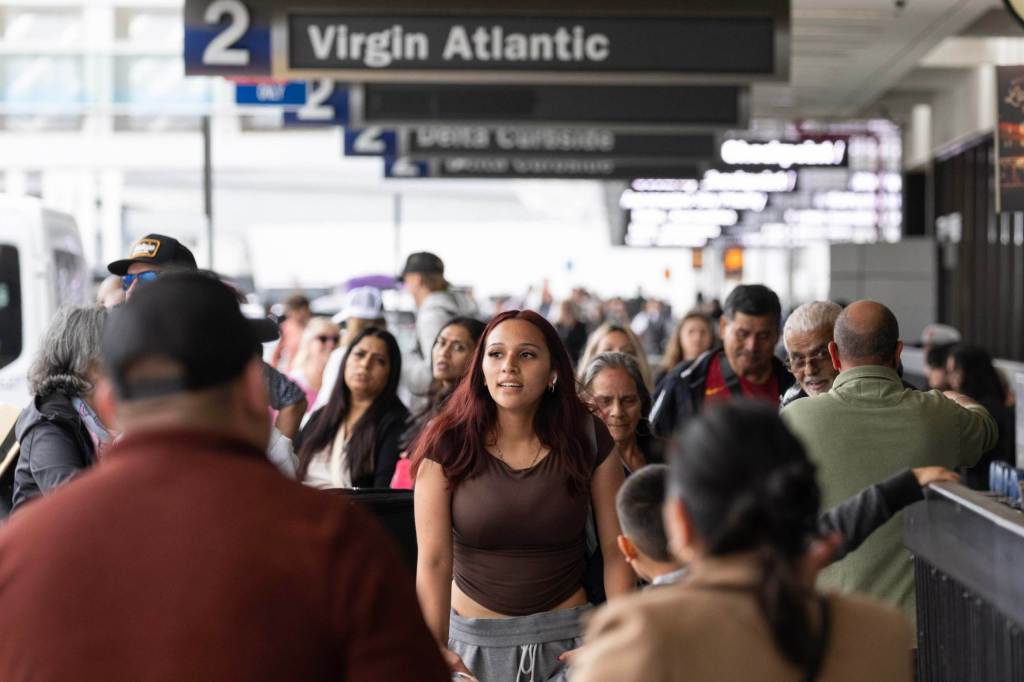
For the last five months, headlines about the Trump administration’s crackdown on immigration have been ubiquitous. Deportations ramping up, people being sent to El Salvador to be imprisoned, the termination of legal status for hundreds of thousands of people, and the list goes on. But the impact of Trump’s war on immigration far exceeds its impact on immigrants.
The administration’s display of its power over immigrants is having the effect of scaring away tourists, severely harming businesses in the tourism industry. The power to restrict immigration and peaceful visitors impinge on Americans’ ability, and sometimes the very right, to trade.
Because the crackdown is an affront to the rights of peaceful people to move and prevent American businesses from earning their business, it’s no surprise that economic havoc is breaking out. Tourism to America had been increasing since the end of the pandemic, and international arrivals were initially projected to surpass 2019 levels, Politico reports. But tourism numbers are now dramatically down and expected to continue that way. Axios found that “the number of foreigners passing through customs at the 10 busiest U.S. airports fell by over 20% year over year toward late March, based on a seven-day rolling average,” signaling reticence from foreigners to visit America.
Additionally, a report by the World Travel & Tourism council earlier this year states that the U.S. is projected to lose $12.5 billion in travel spending this year, representing a 22.5% decline compared to the previous peak. The U.S. may be the only country among 184 developed economies to see lower visitor spending in 2025.
Behind those numbers and statistics are individual Americans who work in the travel industry and who rely on trading with international travelers to make a living—the business owners, waiters, and hotel workers. The American businesses who will make lower profits than they did before. Many individuals in the industry will lose their jobs, or won’t make rent, or won’t be able to buy a home, or simply will earn much less than if they had been allowed to trade in relative freedom.
While visa and other travel restrictions make the U.S. a harder country to visit than many others, America is still a big travel destination and over 70 million people visited it in 2024. Tourists and Americans benefitted from the exchange. Visa restrictions aside, the U.S. was generally welcoming of temporary visitors.
But that may soon change. There are many factors persuading travelers not to come, such as “boycott USA” campaigns triggered by Trump’s tariffs, or simply individual boycotts. A boycott doesn’t violate the rights of American businesses—but the fact that travelers are holding back due to government policies kills companies’ ability to earn tourists’ business.
Importantly, the effect of border policies is one of the major worries on travelers’ minds. “The actions and words of the U.S. right now are not very welcoming to international visitors,” Henry Harteveldt, president of Atmosphere Research Group, told Axios. Harteveldt is right: the U.S. government has had a noticeable change of attitude towards foreigners in the last five months.
A Canadian traveler recently told the BBC that “my partner and I decided not to go ahead with our planned vacations to the US this year… I worry about the border and getting stuck somehow . . . There’s just a sense of uneasiness around visiting America at the moment.” That sentiment is shared by millions worldwide.
Reports of tourists being detained for weeks or turned back at the border have increased under Trump, as well as reports of aggressive immigration enforcement that has sent chills down the backs of millions worldwide. While detentions at the border and harsh enforcement are not new to the Trump administration, its proud attitude towards them leaves prospective visitors afraid they’ll fall victim to arbitrary power and scares them away.
Notably, millions of Americans who work in the travel industry will be impacted by the diminished influx of visitors, because the number of potential customers will decrease. An attack on peaceful foreigners, visitors or immigrants, is really an attack on Americans’ right to trade with them. To arbitrarily detain people or threaten them with detention is to artificially limit the number of individuals that Americans could be working to earn as customers and trading with.
Think of a business like Disneyworld, whose international client base is approximately 23%, and what a hit it will take if the current trend in tourism continues or worsens. Big companies like Disney also indirectly create many thousands of jobs around them—from private transportation services that take tourists to and from the parks, to travel agencies, to hotels, and more. Think of smaller businesses, too—like the shops around Times Square that sell souvenirs, or the taxi and Uber drivers who take international visitors to and from the airport. These are all people who want to earn foreigners’ business, make a profit and continue working. Without people to buy their products, they are severely impacted on their ability to do so. There’s no substitute for clients to trade with.
Tourism can always decline due to market reasons, such as a new and better travel destination popping up. Businesses can address that by making their offers more attractive and can plan according to foreseeable risk. But a government intervention that dramatically reduces tourism overnight by implementing or threatening force can be an insurmountable obstacle for many.
The federal government should protect U.S. borders against threats, as it has been doing for decades to an extremely high degree of success. But preventing or dissuading peaceful foreigners from visiting and giving their business to willing Americans is an attack on both.
Agustina Vergara Cid is a Young Voices Contributor. You can follow her on X at @agustinavcid



